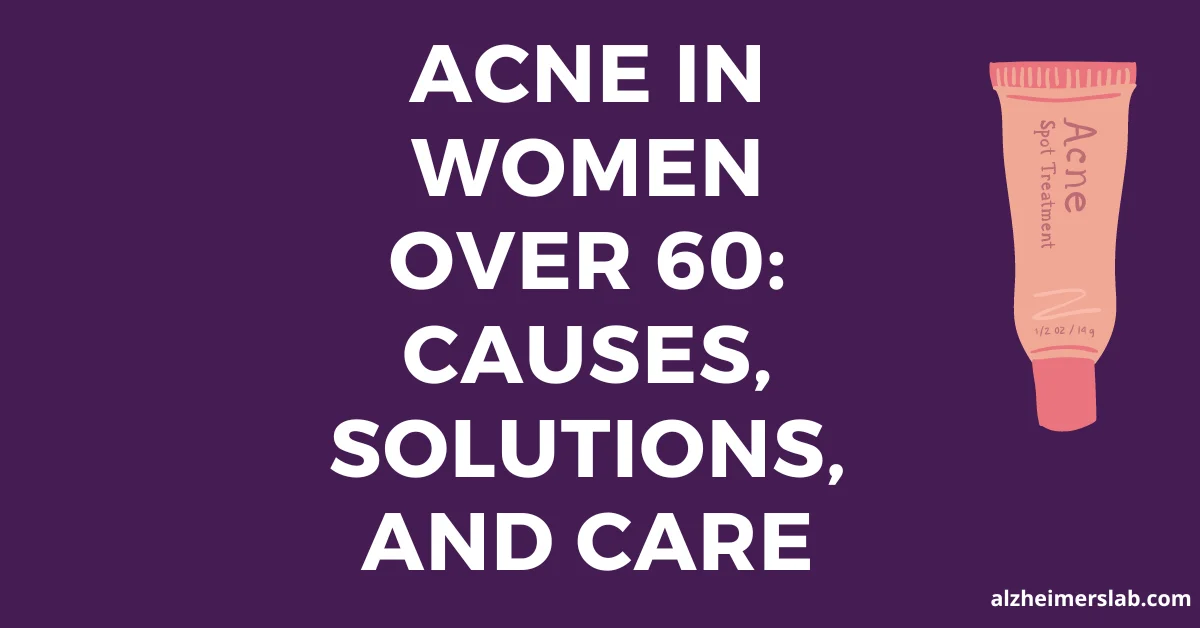Acne in Women Over 60: Causes, Solutions, and Care
Acne is often seen as a teenage woe, but did you know it can affect women over 60 too? In this article, we’ll break down the causes, potential solutions, and practical tips for dealing with acne in senior women.
What Causes Acne in Women Over 60?
Contrary to popular belief, acne isn’t just a youth problem. Several factors contribute to acne in women over 60. Here’s a rundown:
1. Hormonal Changes
Acne can flare up due to hormonal shifts, even in later years. Menopause can cause imbalances, leading to acne outbreaks.
2. Medications
Some medications, like corticosteroids or lithium, may trigger acne as a side effect. Always check with your doctor about potential skin reactions to your medications.
3. Skincare Products
Heavy or comedogenic (pore-clogging) skincare products might be culprits. Always choose products labeled “non-comedogenic” to prevent acne breakouts.
Is Acne Common in Seniors Over 60?
Yes, acne can affect women well into their senior years. While it might not be as prevalent as in younger age groups, it’s crucial to understand that acne doesn’t discriminate based on age.
How Does Acne Appear, and How to Identify It?
Acne in older women can manifest in various ways:
Whiteheads and Blackheads:
These are non-inflammatory acne types. Whiteheads are closed, while blackheads are open and oxidized.
Papules and Pustules:
Inflammatory acne includes red, swollen bumps (papules) and pus-filled lesions (pustules). These can be more noticeable and potentially painful.
Cysts and Nodules:
Severe cases may lead to deeper, painful lumps (nodules) or pus-filled sacs (cysts). These can leave scars and require professional attention.
Could It Be Something More Lethal?
While acne is typically harmless, it’s essential to rule out more serious skin conditions. If you notice sudden changes or if the acne seems unusual, consult a dermatologist to rule out skin cancers or other serious issues.
Over-the-Counter Ointments – Do They Work?
Benzoyl Peroxide:
This common ingredient helps kill bacteria on the skin’s surface and can be effective against mild acne. Start with lower concentrations to avoid irritation.
Salicylic Acid:
Known for its exfoliating properties, salicylic acid helps unclog pores. It’s useful for blackheads and whiteheads.
Retinoids:
Over-the-counter retinoids can promote skin cell turnover, reducing the risk of clogged pores. These can be effective but may cause dryness, so use them sparingly.
Sulfur-based Products:
Sulfur helps break down blackheads and whiteheads and is often found in spot treatments.
Home Herbal Remedies
Tea Tree Oil:
This natural oil has antimicrobial properties, making it effective against acne-causing bacteria. Use cautiously, as it can cause irritation in some individuals.
Aloe Vera:
Aloe vera has anti-inflammatory properties and can soothe irritated skin. Apply the gel directly from the plant or look for products with a high aloe content.
Green Tea Extract:
Green tea has antioxidants that can benefit the skin. You can use cooled green tea as a toner or look for skincare products containing green tea extract.
Solutions and Care
Maintain a Gentle Skincare Routine:
Cleanse your face with a mild, non-drying cleanser twice a day. Avoid harsh scrubs that can irritate the skin.
Hydration is Key:
Drink plenty of water to keep your skin hydrated. Well-hydrated skin is less prone to irritation and acne.
Healthy Diet:
A balanced diet rich in fruits, vegetables, and whole grains supports overall skin health. Limit dairy and sugary foods, as they may contribute to acne in some individuals.
Regular Exercise:
Exercise promotes blood circulation, which is beneficial for the skin. Just ensure you clean your face afterward to prevent sweat-induced breakouts.
Regular Doctor Check-ups:
If acne persists or worsens, consult a dermatologist. They can provide personalized solutions and rule out underlying health issues.
Conclusion
Acne in women over 60 may be unexpected, but it’s manageable. By understanding the causes and adopting a gentle skincare routine, you can keep your skin healthy and glowing. If in doubt, always consult a healthcare professional for tailored advice. Remember, age is just a number, and so is your ability to care for your skin!

